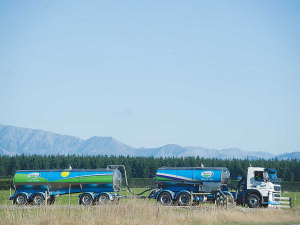Another Windfall for Fonterra Farmers, Unit Holders
Fonterra farmer shareholders and unit holders are in line for another payment in April.
 The environment has been at the forefront of how the tanker team at Fonterra's Te Awamutu site has been operating, well before the Covid outbreak.
The environment has been at the forefront of how the tanker team at Fonterra's Te Awamutu site has been operating, well before the Covid outbreak.
One of the (positive) side-effects of Covid-19 is the improved air and water quality.
Less travel and manufacturing activity has meant those in normally polluted cities have been able to breathe easier and the Venice canals have never been clearer.
But how do we make sure those gains are made permanent and aren't lost post-Covid?
The environment has been at the forefront of how the tanker team at Fonterra's Te Awamutu site has been operating, well before the outbreak. It's been reducing emissions, simply by adopting economical driving techniques.
Matt Roberts, depot manager at Te Awamutu, says the co-op's depots across New Zealand have been tasked with demonstrating how drivers can reduce fuel usage. He says Te Awamutu's drivers have risen to the challenge.
"We essentially showed our drivers the data of where we were, and where we needed to be to reach our sustainability targets.
"The presentation touched the hearts and minds of the drivers. When they realised the potential impact they could have on the environment and for our co-op, many of them felt a responsibility to improve."
Not only have the drivers from the Te Awamutu site collectively saved 16,615 litres of fuel and 46 tonnes of CO2 emissions in the past year, it's had a direct financial impact.
"When they see the fuel barrels, it really hits home the reality of the impact they have on the environment, just from changing their driving style - they were really chuffed."
Fonterra tanker driver Stephen Putt says he was inspired to change his driving technique in 2015, when Fonterra nominated him to compete in The Volvo Fuel Challenge.
"The only problem was they only told me about the event a month before! That was a steep learning curve, but it gave me the push I needed to change my driving style completely."
Stephen placed 5th in the New Zealand event, but he reckons if he got another chance, he'd win it. With his current performance, Stephen uses around 40 litres per 100km (the Te Awamutu driver average is 47.66 litres per 100km) but says there's a lot of concentration involved to reach this level of fuel efficiency.
"You've got to stay on your game, it's alway got to be on your mind. I mainly try to scan ahead and memorise the routes, to drive more efficiently."
Techniques include reduced engine braking, maintaining a steady speed, limiting the number of stop-starts and using the truck's momentum to coast around corners.
To remind Te Awamutu drivers of the impact they're having, there's a life-sized VPM (Visual Performance Metric) in the drivers' carpark in the form of fuel barrels.
Matt says, "when they see the fuel barrels, it really hits home the reality of the impact they have on the environment, just from changing their driving style - they were really chuffed."
The Meat Industry Association of New Zealand (MIA) today announced that Chief Executive Officer Sirma Karapeeva has resigned from the role.
The winners of the 2026 Hawke’s Bay/Wairarapa Dairy Industry Awards were announced at the annual awards dinner held at Copthorne Solway Park in Masterton on Thursday evening.
Environment Southland is welcoming this week’s decision by the Environmental Protection Authority (EPA) to approve the release of Blaptea elguetai, a leaf‑feeding beetle that will help control the highly invasive Chilean flame creeper.
This March, the potato industry is proudly celebrating International Women’s Day on 8 March alongside the International Year of the Woman Farmer, recognising the vital role women play across every part of the sector — from paddocks and packhouses to research, leadership, and innovation.
Fruit trader Seeka posted a record profit and returns to shareholders in 2025.
Recent weather events in the Bay of Plenty, Gisborne/Tairawhiti, and Canterbury have been declared a medium-scale adverse event.
OPINION: Staying with politics, with less than nine months to go before the general elections, there’s confusion in the Labour…
OPINION: Winston Peters' tirade against the free trade deal stitched with India may not be all political posturing by the…